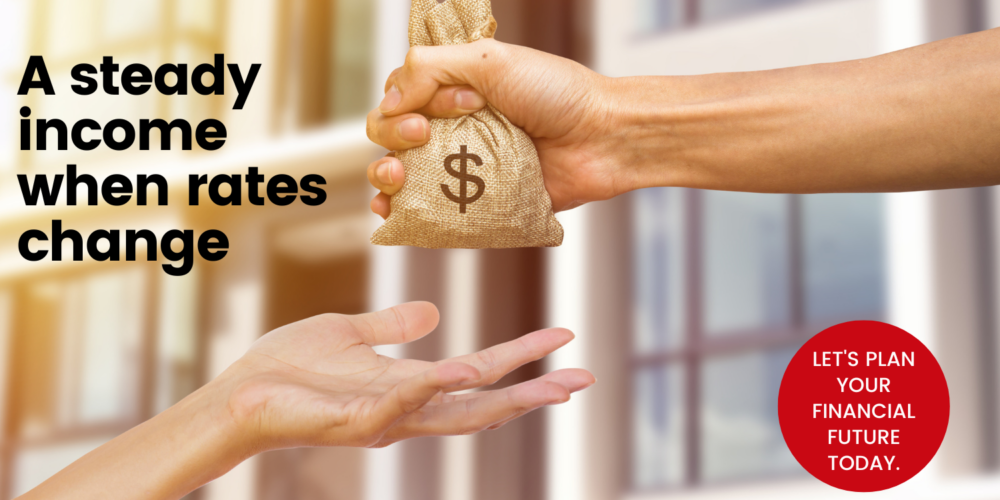When you're not longer working you need an income replacement strategy. How is your strategy affected by changing interest rates?

More Time or More Money?
Guest post by Hal Hershfield, Ph.D.
Consultant to Avantis Investors®
One of my favorite headlines from The Onion reads: “Thirty-one-year-old Edward Brawley’s plan to get himself an umbrella from a random lost and found took two hours, but it saved him $2.99.” What a relatable tale. After all, who among us hasn’t found ourselves in situations where we are completely ignorant of the value of our time?
Before you think too deeply about the fictional Edward Brawley, let me ask you a question that relates to his plight. Off the top of your head, if you could have more time or more money, which would you choose?
I know, I know: It’s a somewhat ridiculous thing to ask. And I’ve deliberately left the question abstract. You don’t know, for instance, whether I’m talking about more hours in the day or more years in your life. But to some extent, how you interpret the question doesn’t really matter.
How You Spend Your Time May Affect Your Well-being
Several years ago, in a series of studies with my colleague and friend, Cassie Holmes, I put this question of “More time or more money?” to thousands of adults. Perhaps it’s not shocking to find that a majority of adults — just like Brawley — preferred money to time.1
There’s, of course, a good reason why many of us readily opt for more money over more time when given a choice — money is a lot easier to measure than time. We can easily point to how our lives might be better if we had an extra $10,000. But with only 24 hours in the day, it’s much more difficult to quantify how extra time in our days would significantly impact our lives (and to quantify how little “losses” of 10 minutes here and 10 minutes there, add up to hours or even days over the course of a year).
Along these lines, in her book Time Smart, Ashley Whillans, an assistant professor at Harvard Business School, points to research suggesting that we are more sensitive to a small loss of money than a small loss of time.2 Whillans illustrates this tension using an example of two hypothetical coffee shops.
At one, the coffee costs $2.50 a cup, and the shop is rarely visited by any of your friends or acquaintances. At the other, the coffee is $4 a cup, and because the café is in your neighborhood, you can bet that you’ll regularly be interrupted by neighbors, friends, and a barista with whom you’ve become friendly over the years. So, which shop is better?
The latter is more expensive, so it might be easy to say that it’s not the “right” choice. We can easily quantify the financial savings without recognizing that in many ways, the more expensive café — the one with more social interactions — may actually be better for our long-term well-being.
As Professor Whillans points out, workers who take more breaks and workers who are happier do better work. This coffee shop vignette is clearly hypothetical, and you may not face such cut-and-dry time versus money choices in your life, but you can see how you may be led astray if you just focus on saving money in your daily decisions.
Part of the issue is that many of us incorrectly assume that making more money will make us happier. Yet, one of the main things that earning money makes us want to do is … make more money. More time, on the other hand, allows us to do more of the meaning-making things that actually impact happiness.
Yet, valuing money over time — as automatic as it may be to do so — can be linked to (and can lead to) worse outcomes when it comes to our happiness. In the studies I conducted with Professor Holmes, and in research Professor Whillans independently conducted with her collaborators, people who opted for more time over more money tended to score higher on measures of happiness and well-being.3
There’s an obvious objection here. Couldn’t it be the case that the richer people — who therefore had a secure base of money — were the ones who were happier and could thus afford to “want” more time? Well, not exactly.
As it turned out, when we took into account things like income, age, education, gender and other demographic characteristics, we still found that a desire for more time over more money was linked to greater happiness. These results weren’t confined to simple correlations, either.
For instance, when we experimentally prompted research participants to focus on why they’d want time over money, they were subsequently happier than a group who was asked to focus on wanting money over time.
Ways to Take Better Advantage of Our Time
So, if we may benefit in unexpected ways from more time in our lives, how can we get more of it? This question is at the heart of Whillans’s book as well as an excellent new one by Holmes called Happier Hour: How to Beat Distraction, Expand Your Time, and Focus on What Matters Most.4
Holmes makes a compelling case for reframing the question: It’s not that we should be asking how we can get moretime, but rather, what are the things we can do to make sure that we take better advantage of the time we do have. Along the way, she spotlights actionable steps you can take to improve your relationship with time.
Let me highlight just a few techniques, many of which are discussed in deeper and more accessible ways in both Whillans’s and Holmes’s books.
Determine where, in your days and weeks, you “lose” time.
What time traps do you have? Don’t just come up with a few obvious answers. If you really want to get a good picture of your time and where you lose it, engage in a “time audit.” Track your time for a week to see where it goes.
Are there ways you can capture some of your time back? What activities can you get rid of? Which ones can you pair with others? And, maybe most importantly: Are there ways you can shift some of your budget to spend money on time-saving services? As Whillans has found in her work, up to a certain point, people who “buy time” are happier, even when you control for baseline levels of income.5
Focus on your “Big Why”
Consider how your decisions involving expenditures of time relate back to this Big Why. I teach my MBA students to generate “positioning statements,” which are essentially corporate blueprints detailing value propositions and how they will be executed. In reality, these documents can act as guideposts for businesses. When faced with difficult decisions, referring to the positioning statements can help dictate the best, most valued path. In the same way, we can think about our Big Why as a focus on our values and how they play into the decisions we make with our time.
Of course, I’m just scratching the surface, but if we want to recapture some of our lost time, it may make sense to start considering how we spend it.
Sources: Avantis
1 Hal E. Hershfield, Cassie Mogilner and Uri Barnea, “People Who Choose Time Over Money Are Happier,” Social Psychological and Personality Science 7, no. 7 (2016): 697-706.
2 Ashley Whillans, Time Smart: How to Reclaim Your Time and Live a Happier Life, (Boston: Harvard Business Review Press, 2020).
3 Ashley V. Whillans, Aaron C. Weidman, and Elizabeth W. Dunn, “Valuing Time Over Money Is Associated With Greater Happiness,” Social Psychological and Personality Science 7, no. 3 (2016): 213-222.
4 Cassie Holmes, PhD, Happier Hour: How to Beat Distraction, Expand Your Time, and Focus on What Matters Most, (New York: Gallery Books, 2022).
5 Ashley V. Whillans, Elizabeth W. Dunn, Paul Smeets, and Michael I. Norton, “Buying time promotes happiness,” Proceedings of the National Academy of Sciences 114, no. 32 (2017): 8523-8527.
M & A Consulting Group, LLC, doing business as CAM Investor Solutions is an SEC registered investment adviser. As a fee-only firm, we do not receive commissions nor sell any insurance products. We provide financial planning and investment information that we believe to be useful and accurate. However, there cannot be any guarantees. This blog has been provided solely for informational purposes and does not represent investment advice or provide an opinion regarding fairness of any transaction. It does not constitute an offer, solicitation or a recommendation to buy or sell any particular security or instrument or to adopt any investment strategy. Past performance is not a guarantee of future results. Diversification does not eliminate the risk of market loss. Tax planning and investment illustrations are provided for educational purposes and should not be considered tax advice or recommendations. Investors should seek additional advice from their financial advisor or tax professional.



